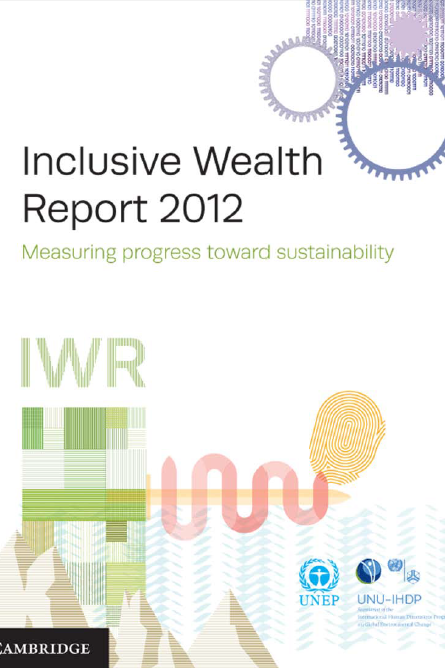Inclusive Wealth Report 2012
Measuring progress toward sustainability

The Inclusive Wealth Report 2012 is a joint initiative of the United Nations University International Human Dimensions Programme on Global Enivronmental Change (UNU-IHDP) and the United Nations Environment Programme (UNEP) in collaboration with the UN Water Decade Programme on Capacity Development (UNW-DPC) and the Natural Capital Project. This volume may be cited as: UNU-IHDP and UNEP (2012). Inclusive Wealth Report 2012. Measuring progress toward sustainability. Cambridge: Cambridge University Press.
Foreword
The preliminary findings of the Inclusive Wealth Report (IWR) initiative are presented in this publication: they provide for policymakers
an initial analysis towards a broader and comprehensive way of measuring inclusive progress within their economies. There has for some time been a shared recognition that conventional indicators such as gross domestic product (GDP) or the Human Development Index (HDI) are failing to capture the full wealth of a country. These limitations may be in part fueling environmental decline and degradation because changes in natural or “nature-based” assets are not factored into national accounts, rendering those accounts less useful as an indicator of changes in human well-being. This report, produced by the UN University International Human Dimensions Programme on Global Environmental Change and UNEP, builds on the findings of the Millennium Ecosystem Assessment of 2005. It echoes, too, the conclusions of the Stiglitz-Sen-Fitoussi Commission of 2009 which argued that measuring well-being requires a shift from conventional production indicators to metrics that incorporate non-economic markets-based aspects of well-being, including sustainability issues.
The preliminary IWR gives an overview on the evolution of some relevant categories of natural capital, such as forests, for a range of
countries over a 19-year period, comparing their decline or increase against two other areas: produced capital, such as roads and factories; and human capital, including levels of education, knowledge, and creativity. The preliminary findings indicate that it is possible to trace the changes of the components of wealth by country and link these to economic growth, including highlighting the impact of declines or increases in natural capital as an economic productive base. While many economies do appear to be getting wealthier, it is happening often at the expense of the natural capital base which, in the future and over generations, may move the Inclusive Wealth Index (IWI) from the black into the red.


































